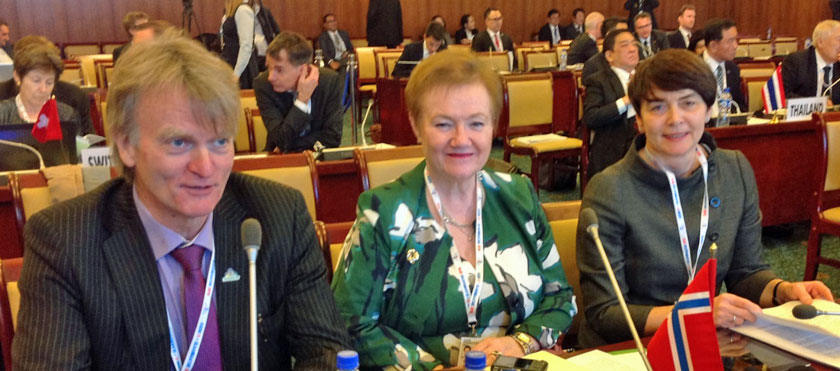
Ove Trellevik, Sylvi Graham and Irene Johansen. Photo: Storting.
Storting attends Asian-European meeting in Mongolia
The Storting’s ASEP delegation took an active part in the Asian-Europe Parliamentary Partnership (ASEP) meeting in Mongolia last week (21–23 April). More than 30 countries and 150 participants met in Ulan Bator to discuss greater regional collaboration.
Irene Johansen ( Acting Head of Delegation), Ove Trellevik and Sylvi Graham represented the Storting’s newly established ASEP delegation. By submitting a number of written proposals they ensured Norwegian influence in the formulation of the meeting’s final declaration. All three participated in panel discussions, and Johansen served as rapporteur for “Connectivity and Effective Mulitilateralism”, one of the two panels. The delegation also took part in bilateral meetings with Finland, Denmark, Switzerland, Australia, Mongolia, Japan and the Philippines.
According to Johansen, the 9th ASEP meeting was conducted in an orderly and constructive way. The Mongolian hosts clearly went all out to make sure things unfolded as smoothly as possible.
“Both geographically and culturally, Mongolia binds Asia and Europe, and politically the Mongolians are used to dealing with two highly influential neighbours,” says Johansen. “Perhaps because of this they have developed a special knack for diplomacy. In any case they showed great ability to find consensus formulations during the negotiations, including on sensitive issues.”
Delegation formed in 2015
The Storting, Norway’s parliament, created a permanent delegation to the Asia-Europe Parliamentary Partnership (ASEP) on 18 June 2015. ASEP is a parliamentary forum associated with the European-Asian dialogue at government level on issues of political, economic and cultural significance (the Asia-Europe Meeting, or ASEM, cooperation). The meeting in Mongolia was the second attended by the Storting, but its first as a formal member with a permanent delegation. The head of the Storting’s delegation to ASEP, Christian Tybring-Gjedde, was unable to attend the meeting.
Main topic: increased cooperation
The major issues discussed during the ASEP meeting in Mongolia were “Connectivity and Effective Mulitilateralism” and “Partnership for the Future”. Increased connectivity will be a key topic for all upcoming ASEM meetings and sub-forums. The ASEM parties are eager for Asia and Europe to establish channels for increased interaction in everything from communications and cultural understanding to infrastructure, trade and policy.

The delegates to ASEP 2016. Photo: Storting.
With regard to the final declaration, the Storting’s delegation had submitted supplementary proposals on combatting inequality in terms of gender, education, health and income and on women's participation in employment – two important prerequisites for increased productivity, economic growth and development. These were the focus of delegation head Irene Johansen’s remarks in the debate on “Connectivity and Effective Mulitilateralism”. She challenged ASEP parliamentarians to pave the way towards socio-economic equality and women’s participation in working life, and she noted that the OECD, the IMF and the World Bank emphasise both of them as prerequisites for economic growth in the world.
In the same panel discussion, Graham stressed the importance of democracy and good governance in work related to multilateral agreements.
“The world faces major challenges on development, climate change and regional security,” she says. “UN sustainability goals and the climate agreement adopted in Paris give us hope that it may be possible to find effective multilateral solutions to the problems. But parliamentarians will have to participate actively.”
China’s “One Belt, One Road” initiative was highlighted during the ASEP meeting in Mongolia as one of the most visible examples of efforts to expand cooperation in the region. Through the initiative, China is seeking to encourage trade by land (along the traditional Silk Road) and by sea (the new, maritime Silk Road) between China and the rest of Eurasia.
The delegation also submitted proposals for the final declaration regarding the topic “Partnership for the Future”.
“Looking forward, a greater emphasis on collaboration and partnership between Asia and Europe is very important for Norway and the Storting,” said Trellevik. “Norwegian history is distinguished by shipping, trade, fishing and other marine activities. In my comments during the panel debate I therefore made the case for marine sustainability, marine security and stability, and for safe and free navigation.”
Update on China
On the way to Mongolia, the Storting’s ASEP delegation visited the Norwegian Embassy in Beijing to receive an update on China and regional developments in Asia. The ASEP delegation believes the Storting should pay more attention to Asia given the economic development of the Asian countries and expectations for their increased influence in global forums. The region is also increasingly important to Norway on matters of trade and foreign policy. Through the European Free Trade Association, for example, Norway is presently engaged in several trade negotiations with ASEAN countries.
Last updated: 27.04.2016 15:15